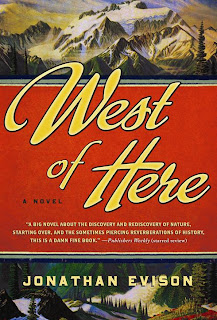 I picked up West of Here by Jonathan Evison based on some rave reviews from other book bloggers, so I started with high expectations. Unfortunately, while I think the novel was certainly ambitious and at times clever and funny, overall it was disjointed and really lacked a clear plot.
I picked up West of Here by Jonathan Evison based on some rave reviews from other book bloggers, so I started with high expectations. Unfortunately, while I think the novel was certainly ambitious and at times clever and funny, overall it was disjointed and really lacked a clear plot.
The book opens in 1890, as a group of explorers arrive at a small, recently settled Pacific Northwest town of Port Bonita to launch an expedition of the nearby Olympic Mountain range that has thus far been untouched by white men. Besides the explorers, there is also a colorful cast of Indians, “celestials”, entrepreneurs, bar owners, prostitutes and social crusaders whose lives and personal struggles we glimpse from time to time. Fast forward 120 years to Port Bonita 2006. The small town has not grown to become a Seattle or Portland as some of the early settlers predicted; instead it and its residents remain as stagnant and dead as the dammed up Elwha River. Here we are introduced to some of the descendents of the 1890s Port Bonita, plus a plethora of other local denizens who make up this backwater town. Honestly, it’s hard to go into more detail than this vague summery because there are at least 30-40 characters with their own intricate and nuanced relationships and problems to follow and keep straight (perhaps a table at the beginning labeling the cast of characters would have been helpful?).
 My biggest problem with this book was that beside a weakly explained (and ultimately silly) magical element and the fact that some of the characters from 2006 were descendents of those from 1890, there was absolutely no connection between the two stories. I assume that Evison was trying to show the evolution (or lack thereof) of Port Bonita and the differences between the passionate, hard-working, and entrepreneurial spirit of the settlers and Indians to the pathetic, weak-willed and irresponsible great-grandsons of Port Bonita 120 years later. However, instead of developing this theme between the two stories, he jumps from one time period to the other, with little or no inter-connectedness. I also disliked that each of the chapters were only 2-3 pages long before jerking you to the next totally unrelated story. Instead of each section coming together as a cohesive story about the community, you get small vignettes of different characters’ lives without really making me care about any of them. This style of storytelling also made the book unnecessarily difficult to follow. I would often confuse the characters and forget key relationships because Evison was constantly bouncing from story to story.
My biggest problem with this book was that beside a weakly explained (and ultimately silly) magical element and the fact that some of the characters from 2006 were descendents of those from 1890, there was absolutely no connection between the two stories. I assume that Evison was trying to show the evolution (or lack thereof) of Port Bonita and the differences between the passionate, hard-working, and entrepreneurial spirit of the settlers and Indians to the pathetic, weak-willed and irresponsible great-grandsons of Port Bonita 120 years later. However, instead of developing this theme between the two stories, he jumps from one time period to the other, with little or no inter-connectedness. I also disliked that each of the chapters were only 2-3 pages long before jerking you to the next totally unrelated story. Instead of each section coming together as a cohesive story about the community, you get small vignettes of different characters’ lives without really making me care about any of them. This style of storytelling also made the book unnecessarily difficult to follow. I would often confuse the characters and forget key relationships because Evison was constantly bouncing from story to story.
Finally, perhaps this is me being nitpicky, but I really disliked the flood of branded products in this book (in fact KFC ends up playing a central role in this book). I generally hate any branded products and pop culture references in books because I feel like at best, this dates your novel and at worst it may leave your readers or future readers confused. It’s totally unnecessary and can be avoided by simply being more generic. I don’t mind if there is an occasional product reference in a book (like a character ordering a Coke at a diner), but I don’t want to feel like you sold space in your book to big companies for product placement.
 I will say that there are times I genuinely enjoyed the book. I was actually really entertained Port Bonita 2006, and found myself laughing frequently at some points. And I did like that the city of Port Bonita turns out to be the most important character in the book. However, I pretty much agree with the New York Times review and don’t think there’s enough pleasurable drama or elegant prose to justify delving into this rather long novel. It’s epically ambitious, but ultimately falls short.
I will say that there are times I genuinely enjoyed the book. I was actually really entertained Port Bonita 2006, and found myself laughing frequently at some points. And I did like that the city of Port Bonita turns out to be the most important character in the book. However, I pretty much agree with the New York Times review and don’t think there’s enough pleasurable drama or elegant prose to justify delving into this rather long novel. It’s epically ambitious, but ultimately falls short.
